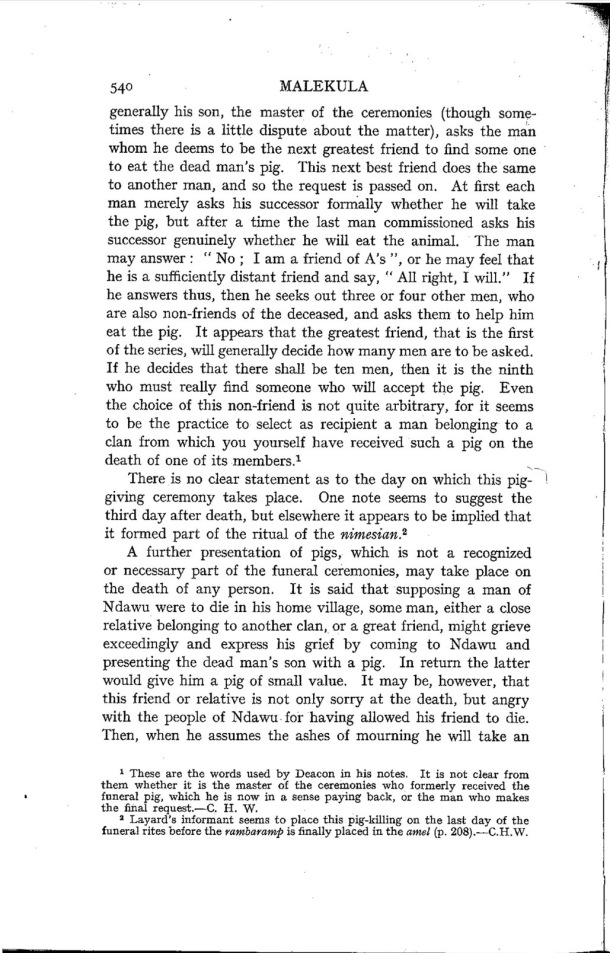|
|  [Note: this transcription was produced by an AUTOMATIC OCR engine]
540 MALEKULA
generally his son, the master of the ceremonies (though some-
times there is a little dispute about the matter), asks the man
whom he deems to be the next greatest friend to ï¬Ånd some one
to eat the dead man's pig. This next best friend does the same
to another man, and so the request is passed on. At ï¬Årst each
man merely asks his successor formally whether he will take
the pig, but after a time the last man commissioned asks his
successor genuinely Whether he will eat the animal. The man
may answer: “ No ; I am a friend of A's â€ù, or he may feel that
he is a sufficiently distant friend and say, “ AH right, I will." If
he answers thus, then he seeks out three or four other men, who
are also non~friends of the deceased, and asks them to help him
eat the pig. It appears that the greatest friend, that is the ï¬Årst
of the series, will generally decide how many men are to be asked.
It he decides that there shall be ten men, then it is the ninth
who must really ï¬Ånd someone who will accept the pig. Even
the choice of this non-friend is not quite arbitrary, for it seems
to be the practice to select as recipient a man belonging to a
clan from which you yourself have received such a pig on the
death of one of its members.‘ s _
There is no clear statement as to the day on which this pig-
giving ceremony takes place. One note seems to suggest the
third day after death, but elsewhere it appears to be implied that
it formed part of the ritual of the nimesianf
A further presentation of pigs, which is not a recognized
or necessary part of the funeral ceremonies, may take place on
the death of any person. It is said that supposing a man of
Ndawu were to die in his home village, some man, either a close
relative belonging to another clan, or a great friend, might grieve
exceedingly and express his grief by coming to Ndawu and
presenting the dead man's son with a pig. In return the latter
would give him a pig of small value. It may be, however, that
this friend or relative is not only sorry at the death, but angry
with the people of Ndawu for having allowed his friend to die.
Then, when he assumes the ashes of mourning he will take an
1 These are the words used by Deacon in his notes. It is not clear from
them whether it is the master of the ceremonies who iormerly received the
funeral pig, which he is now in a sense paying back, or the man who makes
W
the ï¬Ånal request.-—C. H. .
* Layard's informant seems to place this pig~ki1ling on the last day of the
funeral rites before the mmbuwmji is ï¬Ånally placed in the amal (p. Z08).——C.H.W.
|